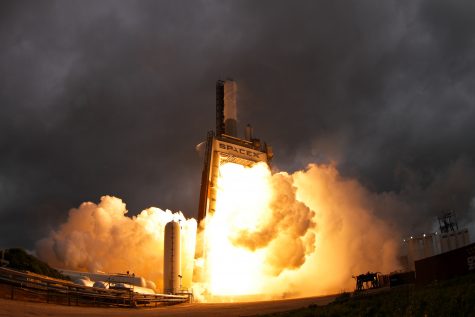Falcon 9 Sparks Trouble for Technological Industries

A spectacular plumage of fire and smoke dazzled the grey skies of Cape Canaveral Air Force Station on the morning of September 1st, 2016. On that disastrous Thursday, a Falcon 9 rocket ship mysteriously exploded, sending out a thunderous sound wave that could be heard over forty miles away. The rocket ship’s launchpad was left in ruins, and both the rocket and its cargo were utterly destroyed. There were no casualties that resulted from this incident.
This explosion marks the second blunder of SpaceX, which is the company that owns the Falcon 9 series. Previously, a prototype-version of the Falcon 9 rocket ship exploded on June 28th, 2015. The explosion, which occurred less than three minutes after launch, destroyed $11 million worth of cargo that was supposed to be transported to the I.S.S. for NASA. The cause of this mishap was a result of a faulty strut that snapped in the upper stage oxygen tank.
The explosion on September 1st did not occur during a launch. Instead, the Falcon 9 rocket ship exploded during an engine test two days before the official launch on September 3rd. The cause of this explosion is still under investigation, but SpaceX representatives have confirmed that it occurred around the upper stage oxygen tank. Along with the rocket ship, a satellite co-leased by Israeli-based telecommunication company Spacecom and Facebook was also destroyed, which may result in legal issues between the affected companies.
The satellite, valued at around $285 million, was supposed to provide digital access to the internet and cellular networks in parts of Europe, sub-Saharan Africa, and the Middle East. The complete destruction of this satellite on Thursday’s explosion left many CEOs discontented, and Mark Zuckerberg, the Facebook CEO, wrote, “I’m deeply disappointed to hear that SpaceX’s launch failure destroyed our satellite that would have provided connectivity to so many entrepreneurs and everyone else across the continent”.
Spacecom, which witnessed straining business relationships and diminishing stock prices after the explosion, is currently trying to replace and re-launch the lost satellite as soon as possible. Thus, SpaceX’s compensations for the satellite may either take the form of $50 million, or a free flight on board another Falcon 9 (which is currently priced between $62-90 million). The company will also receive about $205 million from Israel Space Industries, the aircraft manufacturing company that created the satellite, under an insurance policy that covers the costs of all pre-launch mishaps.
Although the Thursday disaster was detrimental to SpaceX CEO Elon Musk and his partners, analysts predict that there will not be any long-term effects caused by the explosion. Bill Ostrove, an analyst for Forecast International, pointed out that 93 percent of SpaceX launches have been successful so far, which is only slightly lower than the industry’s 95 percent average. “Considering they do have a decent success rate, I don’t see much harm being done to the industry as a whole,” Ostrove explained.
Nonetheless, SpaceX’s immediate future does not seem to be very promising. Elon Musk, in a somewhat frustrated tone, tweeted that the disaster is “turning out to be the most difficult and complex failure we have ever had in fourteen years.”
Future launches of the Falcon 9 rocket ships may also be delayed, considering that SpaceX delayed subsequent Falcon 9 launches six months after the June 28th disaster. Ostrove, in the same interview, commented, “it’s pretty unlikely that they’ll launch again in 2016”.
Despite the risks, delaying future launches also threatens the aerospace company financially, because a cessation of all pre-planned 2016 launches would mean a $200-500 million loss in revenue. The Space Frontier Foundation also estimates an additional loss of $120 million, considering the value of the launch pad and the rocket ship itself. In the absolute worst-case scenario, SpaceX may have to deal with a loss of roughly $700 million by the end of this year.
Fortunately for SpaceX, there are virtually no competitors in the market that can rival the prices that SpaceX has to offer. Although there are separate private companies like Blue Origin with similar initiatives as SpaceX, these companies are still in the process of developing a reliable satellite transportation system. While SpaceX has had a number of highs and lows, it is likely that their efforts will prove successful in the following years to come.





